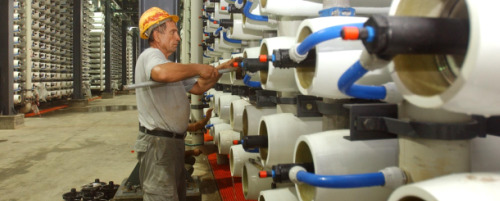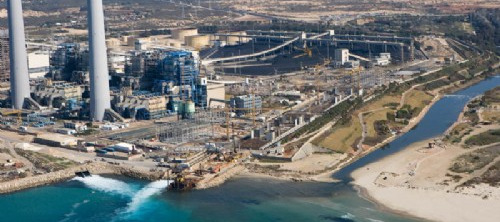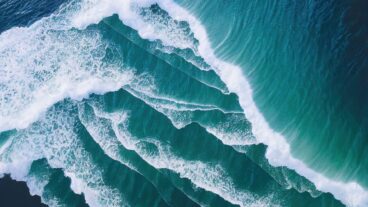Champagne glasses containing the finest fresh water were raised in a toast last month to celebrate the opening of Israel’s third desalination plant, this one in the northern city of Hadera. Lauded as the largest reverse osmosis desalination facility in the world, the plant that takes water from the Mediterranean Sea and makes it safe to drink is expected to produce 127 million cubic meters of water each year – enough to meet the water needs of one in every six Israelis.

Created with an investment of nearly half a billion dollars, the plant was built by IDE Technologies, an Israeli company that has already built two seawater desalination plants on the country’s Mediterranean Sea coastline, along with the Housing and Construction Group, a real estate and development firm owned by the Arison Group.
It was the government that put in place the plan to create the desalination plant, to meet the demands of a growing population and an imperiled water supply, dependent almost entirely on winter rainfall.
In a 25-year agreement with the government and with its full blessing, the water will be produced at just over 50 cents per cubic meter. IDE’s first desalination plant, built on the coast in Ashkelon, has been performing well since 2005, according to company reports. There is a third plant at Palmahim, just south of Tel Aviv, and two more are planned along the coast, in Ashdod and Soreq.
A new era of cheap water?
“The success of the mega-desalination plant concept has ushered in a whole new era of plentiful, affordable water for a world facing severe water challenges,” says Avshalom Felber, IDE Technologies CEO, in a press statement. “With the launch of the Ashkelon plant in 2005, we pledged to continue pursuing further breakthroughs in plant capacity and water cost.”
Ofer Kotler, CEO of the Housing and Construction Group (‘Shikun U’Binui’ in Hebrew) says: “As one of the most complex and largest building projects our group has ever undertaken, we are especially pleased to present this plant to a country facing severe water challenges.”
The project was financed via a consortium of international banks, including the European Investment Bank, Calyon, a French investment bank, and Portuguese investment bank Esperito Santo. Back in 2007, Euromoney, a prestigious business and investment magazine, touted the ‘global village’-style economic deal for the Hadera plant as the Project Finance Deal of the Year.
IDE boasts technological breakthroughs in the fields of thermal and membrane desalination, and also, perhaps surprisingly for a country in the Middle East, in snowmaking. In desalination, the salt is removed from seawater using a process called Reverse Osmosis (RO) one of two ways to use desalination membranes to process water. In RO, water from a highly pressurized salty solution is channeled through a water-permeable membrane to separate it from its salty component. The second approach is via a process called electrodialysis.
IDE is owned by two mega-industrial companies in Israel. The chemical company ICL has a 50 percent stake in IDE (this company also extracts potash and chemicals from the Dead Sea) and Delek Group, an energy and infrastructure investment company and holding tank, owns the other half.

Not an environmentally correct solution
Environmentalists in Israel do not see desalination as a definitive long-term solution for solving the water crisis in Israel and the Middle East, however. One prominent group is Friends of the Earth Middle East (FOEME), whose Israel director Gidon Bromberg points out that desalination plants have a lot of corporate money at stake, in the hands of a few stakeholders. In addition, in the context of climate change and protection of local environments, reliance on the extremely energy-intensive and pollution-emitting desalination process doesn’t appear to be a viable long-term solution, he says.
Bromberg and others dedicated to the protection of local water resources suggest that water-strapped countries like Israel, Jordan and others in the region first identify more effective means of reducing water use at home and cut back on water-intensive agricultural practices.
This debate between industry and the environment isn’t new, and now is the time to create common ground and circumvent a crisis, Shmulik Shai, general manager of H2ID, the Hadera desalination plant, tells ISRAEL21c. He says that for the past five years Israel has been facing a severe shortage in its three main sources of water: The Sea of Galilee, its mountain aquifer and its coastal aquifers. Below the red line in terms of volume and nitrates, if the country doesn’t find a solution now, these sources could be damaged indefinitely, he warns.
“The balance of rainwater is not good enough,” says Shai. If there’s one short season of rain and a spike in population, Israel’s semi-arid climate could find itself with a “chronic shortage problem,” he continues. And while 70 percent of the country’s water is supplied by rain that falls in the winter months, there are periods of drought in Israel when the rain does not come down at all. To make things worse, rainfall is not evenly distributed, he remarks.
The new plant will furnish a good portion of the 750 million cubic meters of water that Israelis require for personal use, he tells ISRAEL21c. And among the desalination technologies that the Hadera plant utilizes are those developed by IDE, including new processes and new mechanisms, such as how to pressurize the water. To date, IDE has constructed some 400 desalination plants in 40 countries, with a total water output of 2,000,000 cubic meters per day.












